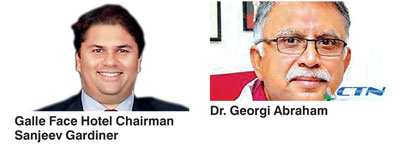Friday Feb 27, 2026
Friday Feb 27, 2026
Thursday, 8 December 2016 00:01 - - {{hitsCtrl.values.hits}}
 By P.K. Balachandran
By P.K. Balachandran
Express News Service/NIE: Sanjeev Gardiner, who heads the Gardiner Foundation (GF) in Sri Lanka, has tied up with Brussels-based International Society Nephrology (ISN), to tackle the scourge of Chronic Kidney Disease (CKD), not just in Sri Lanka, but world-wide.
The 46 year old Gardiner, who owns the iconic Galle Face Hotel in Colombo, was motivated to take up the cause of CKD patients seeing the havoc CKD is causing in Sri Lanka’s rice bowl, the North Central Province (NCP).
Sri Lankan doctors estimate that as many as 400,000 people in NCP may be affected by CKD, with five or six out of 100 people affected.
According to some medical experts, 300 to 600 CKD-related deaths occur in Sri Lankan hospitals annually. Some put the number of deaths due to CKD at 5,000 per annum, as many deaths due to CKD are not recorded as such when they occur at home in remote rural areas.
Dr. Asoka Bandarage says that about 20,000 have died of CKD over the past two decades in the NCP alone, with 80% of the deaths occurring within two years of diagnosis because of late reporting and diagnosis, lack of dialysis machines, non-availability of pure drinking water, expensiveness of the drugs and poverty.
CKD is not commonly found in other rural areas of Sri Lanka though they have rice cultivation practices and lifestyles similar to the NCP. Some researchers consider the “unique hydrochemistry of the drinking water” in the NCP to be the reason for the prevalence of CKD there. Others consider the “hardness of ground water” and the “heavy metal retention capacity” of the soil in the region to be the causative factors.
Fertilisers and pesticides are also blamed. A study published in January 2010 by a team of Sri Lankan and Japanese scientists hypothesised that “the unique hydro-geo-chemistry of the drinking water,” and specifically high levels of fluoride, is the decisive factor in the emergence of CKD in NCP. The rising temperature in NCP has also caused the problem with people having to drink large quantities of chemically polluted water.
Sri Lanka has a relatively comprehensive and free public state health care system. And yet it finds it difficult to keep pace with the alarming rate of growth of CKD. Only about 5% of the Government’s annual health budget is earmarked for the management of CKD.
Private treatment is extremely costly. According to Dr. Bandarage, in 2005, a kidney patient had to spend approximately Rs. 10,000 ($ 79) for dialysis and Rs. 800,000 (approximately $ 6,320) for a kidney transplant. Each tablet now costs about Rs. 350 and that has to be taken without fail and on time.
Kidney donors are extremely difficult to find in Sri Lanka, as kidney sales are illegal here. Until September 2010, kidney donations were accepted only from relatives and members of the clergy. The desperate need for kidneys led to a change in government policy which now allows non-relatives to donate.
CKD in Sri Lanka, Nicaragua, and India have common features: The victims are farm workers; all suffer from “a rare form of kidney damage known as tubule-interstitial disease, consistent with severe dehydration and toxic poisoning”; and a few suffer from diabetes and hypertension.”
In these countries CKD goes undiagnosed as it is insidious disease. It can manifest itself as just a swelling in the ankle or as gastritis. Therefore, it tends to be neglected or incorrectly treated.
Sensing the urgency of the matter, Sri Lanka’s leading hotelier, Sanjeev Gardiner, tied up his Gardiner Foundation (GF) with the International Society of Nephrology (ISN) to start, not just a Sri Lankan, but a global mission, to initiate and ensure the sustainability of multi-faceted activity for the prevention and treatment of CKD.
The ISN-Gardiner Foundation (ISN-GF) is to be inaugurated in Colombo by Sri Lankan President Maithripala Sirisena on December 19. Last year, the President had appointed Gardiner as the “Ambassador for the Prevention of Kidney Diseases.” Since CKD is a social and economic problem, and not just a medical one to be tackled only by doctors and the government, the President wanted a private sector person to be the Ambassador and Gardiner was the natural choice.
Gardiner has secured the help of the Indian nephrologist Prof. Georgi Abraham of the Pondicherry Institute of Medical Sciences, who is also Consultant and Director of Nephrology at the Madras Medical Mission Hospital in Chennai.
Known among his patients as a “saint” for his missionary zeal, Prof. Abraham is involved in the prevention and treatment of CKD both in India and internationally. He was a member of the Governing Council of the ISN between 2005 and 2011.
Gardiner has already contributed Rs. 30 million to the anti-CKD campaign. ISN will manage the fund of the ISN-GF and distribute the benefits among the needy countries. This has been done both for transparency and to reap the benefits of globalisation of the anti-CKD campaign.
In Sri Lanka, the issues are lack of awareness of the nature of CKD, its symptoms, causes and treatment, besides the non-availability of drugs and equipment. Awareness and preventive measures have to propagated, and more dialysis equipment and Reverse Osmosis (RO) plants to supply purified water have to be set up.
Dialysis machines could be imported from India as these are cheaper. A 10,000 gallons a day RO plant, some of which have been set by GF, can serve 100,000 people.